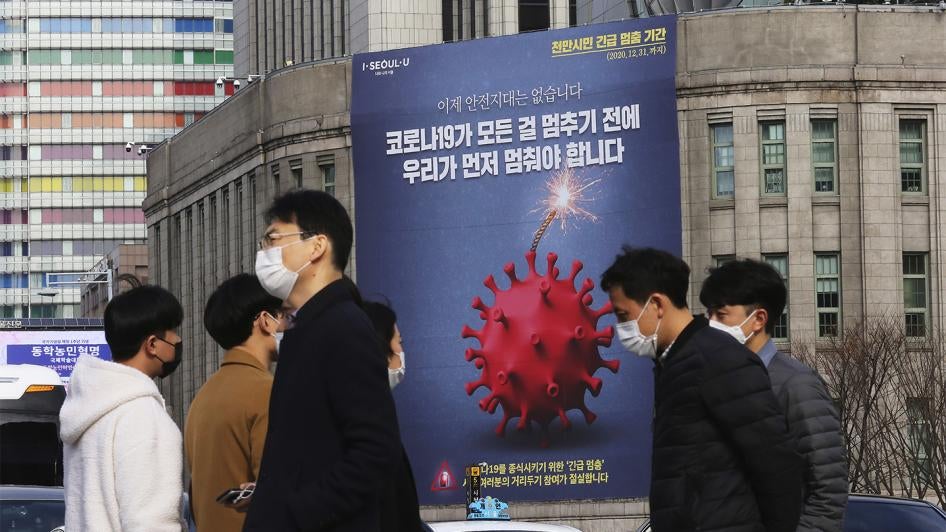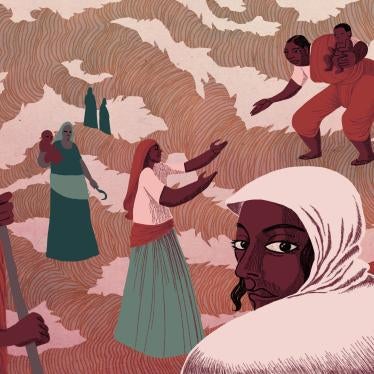(New York, January 13, 2021) – South Korean President Moon Jae-in’s administration weakened its criticism of human rights in North Korea in 2020, including by targeting North Korean human rights organizations in the south, Human Rights Watch said today in its World Report 2021.
The South Korean government broke with its previous practice and declined to cosponsor annual United Nations resolutions on North Korean human rights. Following threats by North Korea, it also cancelled, in violation of international law, operating permits of two groups in South Korea that sent leaflets and food into North Korea via balloons and plastic bottles, reversing decades of South Korean policy.
“President Moon has forgotten his past career as a human rights advocate by capitulating to North Korea’s Kim Jong Un on rights issues,” said John Sifton, Asia advocacy director at Human Rights Watch. “South Korea should be promoting respect for human rights everywhere on the Korean peninsula, in both the north and the south of the 38th parallel, but instead it has weakened its opposition to North Korean human rights violations.”
In the 761-page World Report 2021, its 31st edition, Human Rights Watch reviews human rights practices in more than 100 countries. In his introductory essay, Executive Director Kenneth Roth argues that the incoming United States administration should embed respect for human rights in its domestic and foreign policy, in a way that is more likely to survive future US administrations that might be less committed to human rights. Roth emphasizes that even as the Trump administration mostly abandoned the protection of human rights, other governments stepped forward to champion rights. The Biden administration should seek to join, not supplant, this new collective effort.
The South Korean government lessened the impact of the Covid-19 pandemic by adopting massive testing, data-intensive contact tracing, and the promotion of social distancing. Some of the measures violated privacy rights and led to the public identification of people who had tested positive, resulting in stigmatization of already marginalized groups. In May, as bars and other venues reopened following a decline in Covid-19 cases, dozens of new cases appeared and were linked to nightclubs in Seoul. Some media described the nightclubs as gay clubs, setting off a wave of online harassment and intimidation against LGBT people.
South Korea has a generally open and democratic governing system, with a relatively free press and lively civil society, but pervasive and widespread discrimination against marginalized groups, including women and sexual minorities, is a serious problem. The Economist magazine’s “Glass Ceiling Index,” which evaluates women’s higher education attainment, and numbers of women in managerial positions and in parliament, gives South Korea the lowest rank among countries that belong to the Organization for Economic Co-operation and Development.
South Korea’s #MeToo movement continued to gain ground in 2020, as several high-level local officials were identified as having committed sexual violence, including a former mayor of Seoul. The police targeted a network of chat rooms on the messaging app Telegram where users were viewing, sharing, and trading non-consensual images of women and girls. Over 1,000 suspects, mostly men under 40, were under investigation, including 149 government workers, with over 80 percent from the military, and eight teachers, four police officers, and two fire fighters.
|
News Release
South Korea: Backtracking on Rights Protections
Address North Korea Concerns, Plight of Marginalized Groups
Your tax deductible gift can help stop human rights violations and save lives around the world.
Region / Country
Tags
Most Viewed
-
November 25, 2019
A Dirty Investment

-
June 3, 2025
“They’re Ruining People’s Lives”

-
January 25, 2024
“We’re Dying Here”

-
February 24, 2026
Iran: Tsunami of Arbitrary Arrests, Enforced Disappearances

-
November 19, 2012
Losing Humanity


